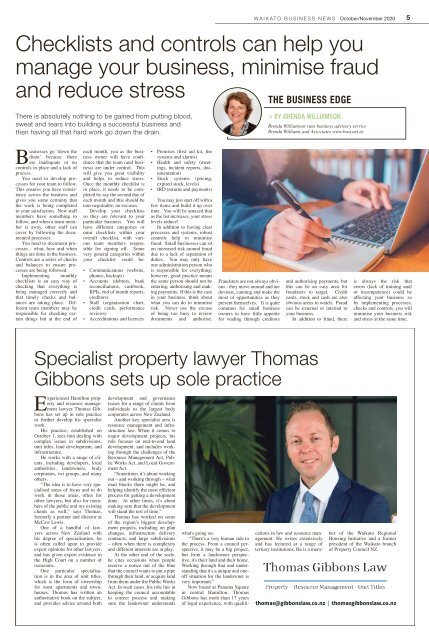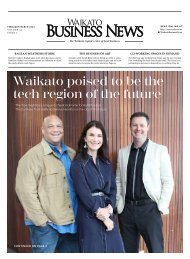Waikato Business News October/November 2020
Waikato Business News has for a quarter of a century been the voice of the region’s business community, a business community with a very real commitment to innovation and an ethos of co-operation.
Waikato Business News has for a quarter of a century been the voice of the region’s business community, a business community with a very real commitment to innovation and an ethos of co-operation.
You also want an ePaper? Increase the reach of your titles
YUMPU automatically turns print PDFs into web optimized ePapers that Google loves.
WAIKATO BUSINESS NEWS <strong>October</strong>/<strong>November</strong> <strong>2020</strong><br />
5<br />
Checklists and controls can help you<br />
manage your business, minimise fraud<br />
and reduce stress<br />
There is absolutely nothing to be gained from putting blood,<br />
sweat and tears into building a successful business and<br />
then having all that hard work go down the drain.<br />
THE BUSINESS EDGE<br />
> BY BRENDA WILLIAMSON<br />
Brenda Williamson runs business advisory service<br />
Brenda Williams and Associates www.bwa.net.nz<br />
<strong>Business</strong>es go ‘down the<br />
drain’ because there<br />
are inadequate or no<br />
controls in place and a lack of<br />
process.<br />
You need to develop processes<br />
for your team to follow.<br />
This ensures you have consistency<br />
across the business and<br />
gives you some certainty that<br />
the work is being completed<br />
to your satisfaction. New staff<br />
members have something to<br />
follow, and when a team member<br />
is away, other staff can<br />
cover by following the documented<br />
processes.<br />
You need to document processes<br />
- what, how and when<br />
things are done in the business.<br />
Controls are a series of checks<br />
and balances to ensure processes<br />
are being followed.<br />
Implementing monthly<br />
checklists is an easy way of<br />
checking that everything is<br />
being managed correctly and<br />
that timely checks and balances<br />
are taking place. Different<br />
team members may be<br />
responsible for checking certain<br />
things but at the end of<br />
each month, you as the business<br />
owner will have confidence<br />
that the team (and business)<br />
are under control. This<br />
will give you great visibility<br />
and helps to reduce stress.<br />
Once the monthly checklist is<br />
in place, it needs to be completed<br />
by say the second day of<br />
each month and this should be<br />
non-negotiable, no excuses.<br />
Develop your checklists<br />
so they are relevant to your<br />
particular business. You will<br />
have different categories or<br />
mini checklists within your<br />
overall checklist, with various<br />
team members responsible<br />
for signing off. Some<br />
very general categories within<br />
your checklist could be:<br />
• Communications (website,<br />
phones, backups)<br />
• Accounts (debtors, bank<br />
reconciliations, cashbook,<br />
KPIs, end of month reports,<br />
creditors)<br />
• Staff (organisation chart,<br />
credit cards, performance<br />
reviews)<br />
• Accreditations and licences<br />
• Premises (first aid kit, fire<br />
systems and alarms)<br />
• Health and safety (meetings,<br />
incident reports, documentation)<br />
• Stock systems (pricing,<br />
expired stock, levels)<br />
• IRD (returns and payments)<br />
You may just start off with a<br />
few items and build it up over<br />
time. You will be amazed that<br />
as the list increases, your stress<br />
levels reduce!<br />
In addition to having clear<br />
processes and systems, robust<br />
controls help to minimise<br />
fraud. Small businesses can sit<br />
on increased risk around fraud<br />
due to a lack of separation of<br />
duties. You may only have<br />
one administration person who<br />
is responsible for everything;<br />
however, good practice means<br />
the same person should not be<br />
entering, authorising and making<br />
payments. If this is the case<br />
in your business, think about<br />
what you can do to minimise<br />
risk. Never use the excuse<br />
of being too busy to review<br />
documents and authorise.<br />
Fraudsters are not always obvious<br />
- they move around and are<br />
devious, cunning and make the<br />
most of opportunities as they<br />
present themselves. It is quite<br />
common for small business<br />
owners to have little appetite<br />
for wading through creditors<br />
and authorising payments, but<br />
this can be an easy area for<br />
fraudsters to target. Credit<br />
cards, stock and cash are also<br />
obvious areas to watch. Fraud<br />
can be external or internal to<br />
your business.<br />
In addition to fraud, there<br />
is always the risk that<br />
errors (lack of training and/<br />
or incompetence) could be<br />
affecting your business so<br />
by implementing processes,<br />
checks and controls, you will<br />
minimise your business risk<br />
and stress at the same time.<br />
Specialist property lawyer Thomas<br />
Gibbons sets up sole practice<br />
Experienced Hamilton property<br />
and resource management<br />
lawyer Thomas Gibbons<br />
has set up in sole practice<br />
to further develop his specialist<br />
work.<br />
His practice, established on<br />
<strong>October</strong> 1, sees him dealing with<br />
complex issues in subdivisions,<br />
unit titles, land development, and<br />
infrastructure.<br />
He works with a range of clients,<br />
including developers, local<br />
authorities, landowners, body<br />
corporates, iwi groups, and many<br />
others.<br />
“The idea is to have very specialised<br />
areas of focus and to do<br />
work in those areas, often for<br />
other lawyers, but also for members<br />
of the public and my existing<br />
clients as well,” says Thomas,<br />
formerly a partner and director at<br />
McCaw Lewis.<br />
One of a handful of lawyers<br />
across New Zealand with<br />
his degree of specialisation, he<br />
is often called upon to provide<br />
expert opinions for other lawyers,<br />
and has given expert evidence in<br />
the High Court on a number of<br />
occasions.<br />
One particular specialisation<br />
is in the area of unit titles,<br />
which is the form of ownership<br />
for most apartments and townhouses.<br />
Thomas has written an<br />
authoritative book on the subject,<br />
and provides advice around both<br />
development and governance<br />
issues for a range of clients from<br />
individuals to the largest body<br />
corporates across New Zealand.<br />
Another key specialist area is<br />
resource management and infrastructure<br />
law. When it comes to<br />
major development projects, his<br />
role focuses on end-to-end land<br />
development, and includes working<br />
through the challenges of the<br />
Resource Management Act, Public<br />
Works Act, and Local Government<br />
Act.<br />
“Sometimes it’s about working<br />
out – and working through – what<br />
road blocks there might be, and<br />
helping identify the most efficient<br />
process for getting a development<br />
done. At other times, it’s about<br />
making sure that the development<br />
will stand the test of time.”<br />
Thomas has worked on some<br />
of the region’s biggest development<br />
projects, including on plan<br />
changes, infrastructure delivery<br />
contracts, and large subdivisions<br />
– often when there is complexity<br />
and different interests are at play.<br />
At the other end of the scale,<br />
he cites occasions when people<br />
receive a notice out of the blue<br />
that the council wants to put a pipe<br />
through their land, or acquire land<br />
from them under the Public Works<br />
Act. In such cases, his role lies in<br />
keeping the council accountable<br />
to correct process and making<br />
sure the landowner understands<br />
what's going on.<br />
“There's a very human side to<br />
the process. From a council perspective,<br />
it may be a big project,<br />
but from a landowner perspective,<br />
it's their land and their home.<br />
Working through that and understanding<br />
that it's a unique and oneoff<br />
situation for the landowner is<br />
very important.”<br />
Now based at Panama Square<br />
in central Hamilton, Thomas<br />
Gibbons has more than 17 years<br />
of legal experience, with qualifications<br />
in law and resource management.<br />
He writes extensively<br />
and has lectured at a range of<br />
tertiary institutions. He is a member<br />
of the <strong>Waikato</strong> Regional<br />
Housing Initiative and a former<br />
president of the <strong>Waikato</strong> branch<br />
of Property Council NZ.<br />
thomas@gibbonslaw.co.nz | thomasgibbonslaw.co.nz


















